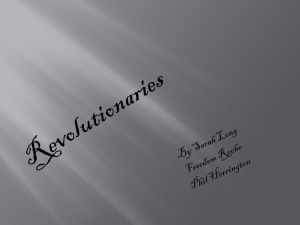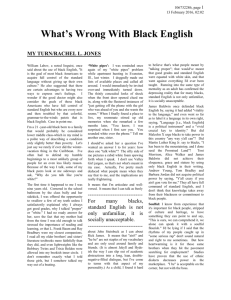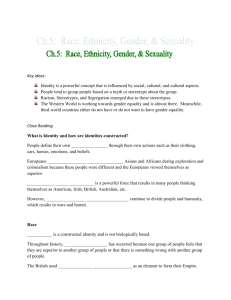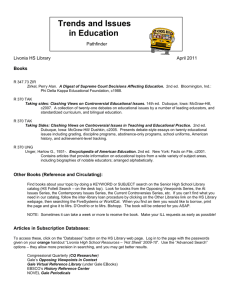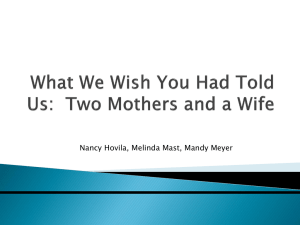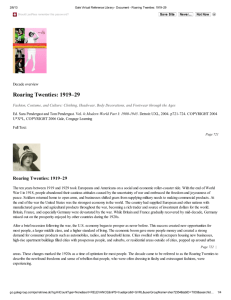http://go.galegroup.com/ps/retrieve.do?sgHitCountType=None&sort
advertisement
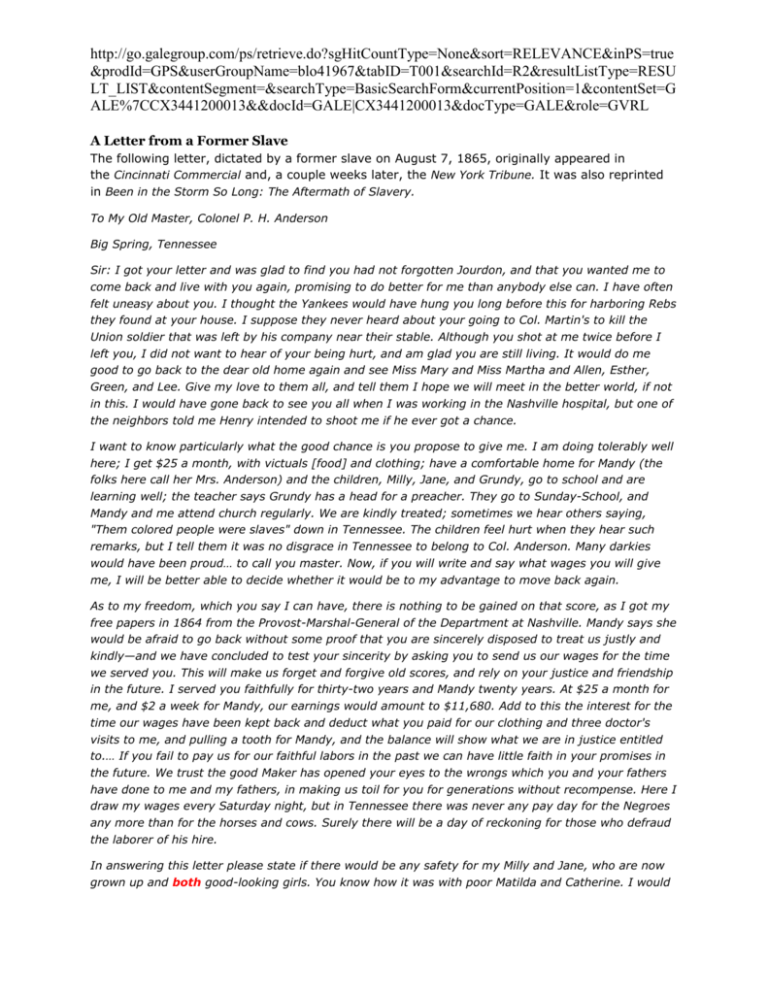
http://go.galegroup.com/ps/retrieve.do?sgHitCountType=None&sort=RELEVANCE&inPS=true &prodId=GPS&userGroupName=blo41967&tabID=T001&searchId=R2&resultListType=RESU LT_LIST&contentSegment=&searchType=BasicSearchForm&currentPosition=1&contentSet=G ALE%7CCX3441200013&&docId=GALE|CX3441200013&docType=GALE&role=GVRL A Letter from a Former Slave The following letter, dictated by a former slave on August 7, 1865, originally appeared in the Cincinnati Commercial and, a couple weeks later, the New York Tribune. It was also reprinted in Been in the Storm So Long: The Aftermath of Slavery. To My Old Master, Colonel P. H. Anderson Big Spring, Tennessee Sir: I got your letter and was glad to find you had not forgotten Jourdon, and that you wanted me to come back and live with you again, promising to do better for me than anybody else can. I have often felt uneasy about you. I thought the Yankees would have hung you long before this for harboring Rebs they found at your house. I suppose they never heard about your going to Col. Martin's to kill the Union soldier that was left by his company near their stable. Although you shot at me twice before I left you, I did not want to hear of your being hurt, and am glad you are still living. It would do me good to go back to the dear old home again and see Miss Mary and Miss Martha and Allen, Esther, Green, and Lee. Give my love to them all, and tell them I hope we will meet in the better world, if not in this. I would have gone back to see you all when I was working in the Nashville hospital, but one of the neighbors told me Henry intended to shoot me if he ever got a chance. I want to know particularly what the good chance is you propose to give me. I am doing tolerably well here; I get $25 a month, with victuals [food] and clothing; have a comfortable home for Mandy (the folks here call her Mrs. Anderson) and the children, Milly, Jane, and Grundy, go to school and are learning well; the teacher says Grundy has a head for a preacher. They go to Sunday-School, and Mandy and me attend church regularly. We are kindly treated; sometimes we hear others saying, "Them colored people were slaves" down in Tennessee. The children feel hurt when they hear such remarks, but I tell them it was no disgrace in Tennessee to belong to Col. Anderson. Many darkies would have been proud… to call you master. Now, if you will write and say what wages you will give me, I will be better able to decide whether it would be to my advantage to move back again. As to my freedom, which you say I can have, there is nothing to be gained on that score, as I got my free papers in 1864 from the Provost-Marshal-General of the Department at Nashville. Mandy says she would be afraid to go back without some proof that you are sincerely disposed to treat us justly and kindly—and we have concluded to test your sincerity by asking you to send us our wages for the time we served you. This will make us forget and forgive old scores, and rely on your justice and friendship in the future. I served you faithfully for thirty-two years and Mandy twenty years. At $25 a month for me, and $2 a week for Mandy, our earnings would amount to $11,680. Add to this the interest for the time our wages have been kept back and deduct what you paid for our clothing and three doctor's visits to me, and pulling a tooth for Mandy, and the balance will show what we are in justice entitled to.… If you fail to pay us for our faithful labors in the past we can have little faith in your promises in the future. We trust the good Maker has opened your eyes to the wrongs which you and your fathers have done to me and my fathers, in making us toil for you for generations without recompense. Here I draw my wages every Saturday night, but in Tennessee there was never any pay day for the Negroes any more than for the horses and cows. Surely there will be a day of reckoning for those who defraud the laborer of his hire. In answering this letter please state if there would be any safety for my Milly and Jane, who are now grown up and both good-looking girls. You know how it was with poor Matilda and Catherine. I would http://go.galegroup.com/ps/retrieve.do?sgHitCountType=None&sort=RELEVANCE&inPS=true &prodId=GPS&userGroupName=blo41967&tabID=T001&searchId=R2&resultListType=RESU LT_LIST&contentSegment=&searchType=BasicSearchForm&currentPosition=1&contentSet=G ALE%7CCX3441200013&&docId=GALE|CX3441200013&docType=GALE&role=GVRL rather stay here and starve and die if it comes to that than have my girls brought to shame by the violence and wickedness of their young masters. You will also please state if there has been any schools opened for the colored children in your neighborhood, the great desire of my life now is to give my children an education, and have them form virtuous habits. P.S. Say howdy to George Carter, and thank him for taking the pistol from you when you were shooting at me. From your old servant, Jourdon Anderson The end of the war and the emancipation of blacks meant something altogether different for the white Southerners who had depended on their slaves' unpaid labor for their livelihood. Defeated by a hated enemy and faced with the huge challenge of rebuilding their shattered lives, these whites expressed a multitude of negative emotions. They were angry and embittered, worried about the future, and Page 55 | Top of Article most of all bewildered about their new relationship with the black people around them. Revealing her belief that blacks could not possibly be independent beings, in charge of their own lives, a former slaveholder quoted in Been in the Storm So Long: The Aftermath of Slavery asked, "If they don't belong to me, whose are they?" This comment highlights the racist attitude common among Southern whites (and also among most Northerners of the period) that held that blacks were inferior to people of northern European descent, were incapable of caring for themselves, and were not suited for anything but serving Page 56 | Top of Article white people. Southerners had, of course, used this racist belief to justify slavery itself, and in the years to come they would use it to keep African Americans from taking their place in society. The changes freedom brought Meanwhile, blacks were learning what freedom meant, and figuring out what to do with it. Probably the most important change was that they no longer had to put up with the brutalities they had endured as slaves, especially the harsh physical punishment they received for misbehavior and the unbearable pain and grief caused when members of families were torn apart as slaveholders sold individuals to other masters. The end of slavery brought a welcome opportunity to strengthen and reestablish family bonds and to begin the building of a strong black community supported by churches, schools, and mutual benefit societies (organizations whose members worked together to help each other). Moving around, or staying put Freedom also meant that former slaves were now free to move around as they wished, whereas before the Civil War they had to have a pass from their masters to leave their own plantations. Many freed people immediately exercised this cherished right, leaving their former homes to look elsewhere for work—far away, perhaps in a large city, or as near as the next plantation. They left to find lost family members or just to be on the move and thus experience freedom. One white family who had always treated their black cook kindly and who now offered to pay her well to continue working for them were told by her, as noted in Reconstruction and Reaction: The Emancipation of Slaves, 1861–1913, "If I stay here I'll never know I'm free." http://go.galegroup.com/ps/retrieve.do?sgHitCountType=None&sort=RELEVANCE&inPS=true &prodId=GPS&userGroupName=blo41967&tabID=T001&searchId=R2&resultListType=RESU LT_LIST&contentSegment=&searchType=BasicSearchForm&currentPosition=1&contentSet=G ALE%7CCX3441200013&&docId=GALE|CX3441200013&docType=GALE&role=GVRL Between 1865 and 1870, the black populations of the ten largest Southern cities doubled, whereas the white populations increased by only 10 percent. In the immediate aftermath of the war, many African Americans believed that the city offered them the most advantages—that there, protected by the more abundant Union soldiers and agents of thePage 57 | Top of Article An illustration from Harper's Weekly shows a representative of the Freedmen's Bureau preventing violence between whites and blacks. Freedmen's Bureau, they would be able to make the most of their freedom. There too, they would find the basis of what would eventually grow into thriving black communities. Both black leaders and the Freedmen's Bureau, however, urged blacks to stay in the countryside and continue working on the farms and plantations. They cited such grim realities of city life as scarce jobs, inadequate housing, widespread poverty and disease, and strict vagrancy laws (which punished those who were unemployed and homeless). For the first time, blacks were crowded together into separate neighborhoods or areas of the cities, a trend that would continue into the twentieth century. Some freed slaves chose to stay where they were or to return after a brief taste of the free life somewhere else. Sometimes they stayed out of loyalty to their former masters but more commonly as a practical choice. With few possessions, little money, and no experience on how to survive on their Page 58 | Top of Article own, many slaves felt they had no choice but to continue in lives very similar to their old ones, except that they must now be paid wages or otherwise compensated for their labor. There were other changes too, especially in the way black people conducted themselves around white people. Some of these changes were viewed with curiosity or amusement by whites, but more often they were shocked and outraged by this evidence of a new way of life to which they must adjust.

